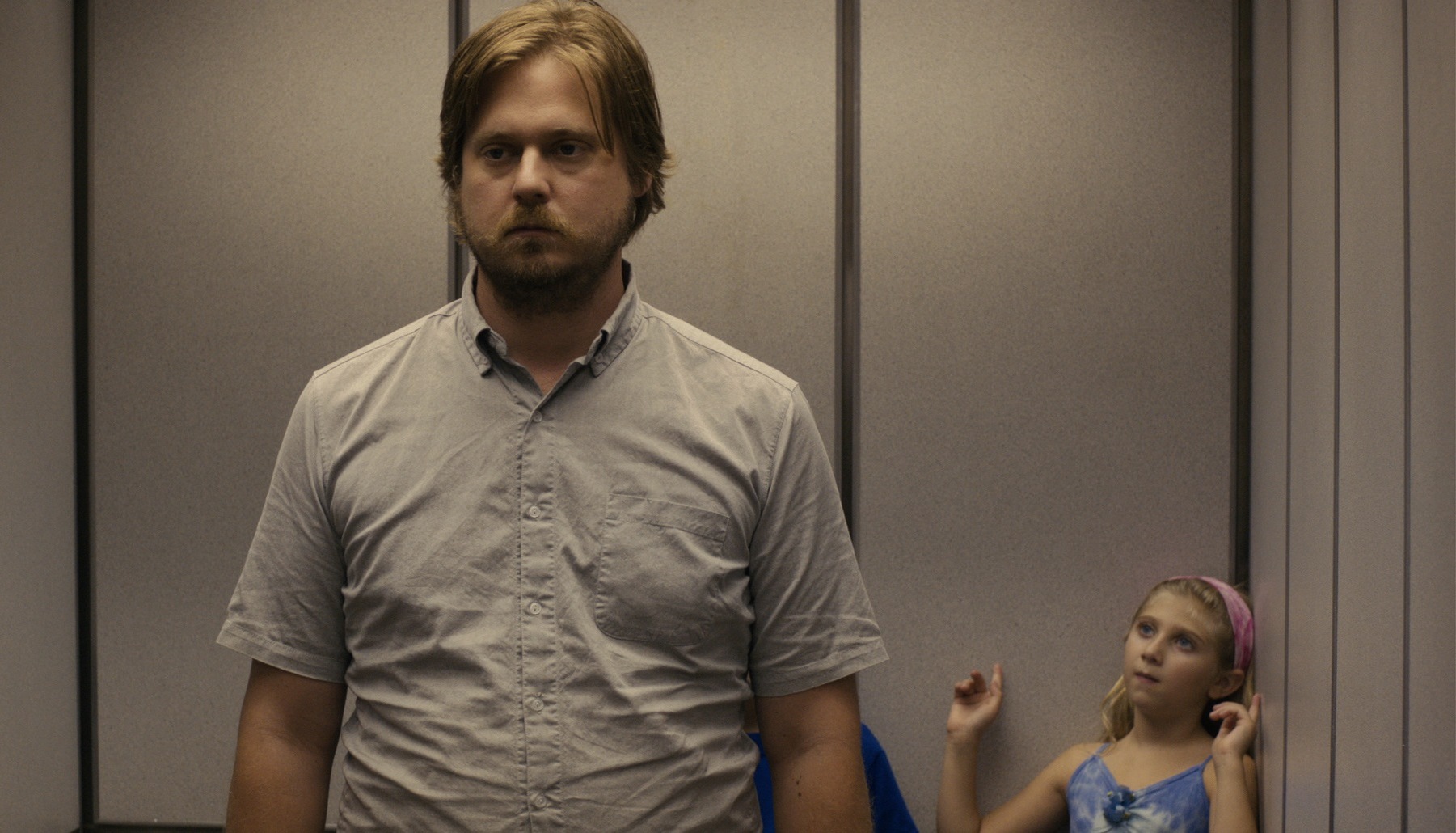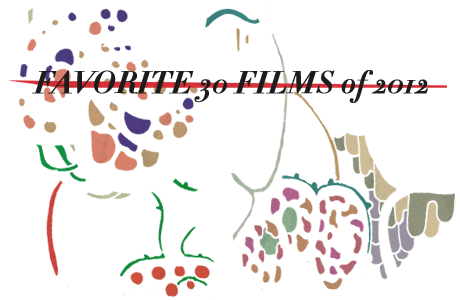We celebrate the end of the year the only way we know how: through lists, essays, and mixes. Join us as we explore the music and films that helped define the year. More from this series
20. Cosmopolis
Dir. David Cronenberg
[Entertainment One]

Perhaps David Cronenberg’s best film since A History of Violence, Cosmopolis (TMT Review) was also one of his most offbeat and humorous. With the help of Robert Pattinson’s brilliantly stoic performance, a crisp and icy color palette, and an ineffably off-kilter tone, Cosmpolis transformed the interior of a limousine, where the first hour of the film took place, into a universe unto itself. A veritable hyperreality of futuristic global capitalism that seemingly operated outside the confines of time, this living, breathing entity thrust Pattinson’s Eric Parker through Manhattan to his favorite barbershop, where he was seemingly immune and indifferent to the chaos and danger of the protests, riots, and crime occurring just on the other side of the glass. His crosstown odyssey was filled with a bizarre array of characters feeding him raw data, tactical advice, and philosophical quandaries, as he gazed at them with similar aplomb, even while getting his prostate examined or taking a pie to the face. The film’s final act, where Parker confronts the outside world, capped off what may be the single most effective examination of the unbridgeable gap between the elite and the 99% of this young decade, and while Cosmpolis did not enjoy the heaps of praise most of Cronenberg’s recent output has received, its sheer singularity and bold engagement with the political climate — with the help of the equally fine Don DeLillo source material — made it one of the most important films of the year and his career.
19. Patience (After Sebald)
Dir. Grant Gee
[Art Events]

I hadn’t read W.G. Sebald’s The Rings of Saturn when I watched Patience (After Sebald) (TMT Review). But I had read The Emigrants, so I had an oblique point of entry — oblique to my advantage. For me, proxy and trauma were at the heart of Grant Gee’s film about Sebald, Sebald’s book, and the walk that represented the occasion for the book and organized its material. (Well, perhaps heart isn’t the right word after all.) The subtle, insinuating soundtrack (courtesy The Caretaker); the hazy, ominous editing; the commentary of other writers — the film dealt directly, in its way, with dark matters: of Sebald’s economy of circumlocution, of Sebald’s circumambient peregrinations — the necessity of looking down at the road in order to see what has already passed along it, the necessity of telling stories in order to hear the truth. Patience was so titled because it takes patience to remain attentive as you spiral around trauma, roundabout and ever closer to the deaths that punctuate life. European history went up in smoke and so did Sebald, but when we felt them near, Patience helped us approach them.
18. The Color Wheel
Dir. Alex Ross Perry
[Cinema Conservancy]

Rejected by Sundance and SXSW and met with a sharply divisive critical response, it’s easy to see why an independent film like The Color Wheel (TMT Review) had trouble finding an audience. Carried by two patently unlikeable characters and photographed in high-grain black-and-white 16mm, the film’s vitriolic episodes cut into each other like rude interruptions, shot through with moments of surrealism that usually offer no easy (or realistic) way out of increasingly awkward encounters. Talk of “influence” is standard in independent film discourse, but though the title’s typeface is stolen from his early novels and its protagonists are gabby neurotic Jews, The Color Wheel had nothing to do with Philip Roth. So what’s the deal? Alex Ross Perry — who directed, co-wrote, edited, and produced the film — crafted a recession-era screwball comedy that was both formally unpredictable and conscious of its own limitations, an anarchic stream of lies and insults that managed to locate a bleeding heart in spite of its blithe negation of convention. Acerbic to the bone, Perry’s dispassion project was low-budget filmmaking gloriously split at the seams; few films this year were as galvanizing in their lack of self-importance.
17. Michael
Dir. Markus Schleinzer
[Strand Releasing]

Benjamin Pearson’s blurb about Michael for our mid-year film list was keener-sighted than all the fully-fledged reviews I read, praiseworthy and condemnatory alike. I came to imagine Michael appearing as a long quotation in a chapter in an imaginary book called The Varieties of Domestic Experience. If William James is right, we learn the most about phenomena by examining not their average but extreme manifestations. This film, then, had something important to teach us, considering the extremeness of its content — psycho-sexual-filial — and the average-ness of its representations of that content. (Or as average as could be possible.) We were horrified; then our horror began to congeal into questions, beginning with, What did the criminal pedophile’s mother see when she opened the steel door in the basement? To our dismay, as these questions rippled outward, their centripetal force grew stronger. Questions about Michael’s desire for and control over the captive boy inexorably triggered questions about how we ourselves learned to desire, what kinds of control we endured, and who suffered under the regime we accepted as normal. It hurt to identify with Michael, but identifying with him proved necessary for understanding. And if we didn’t want to understand, how could we say we’d prefer a world in which Michael didn’t imprison Wolfgang?
16. Magic Mike
Dir. Steven Soderbergh
[Warner Bros. Pictures]

Something strange is happening in the career of Steven Soderbergh. Directors are supposed to get increasingly esoteric and set in their ways as they mature — not so for the Sex, Lies, and Videotape wunderkind, who seems to get more open-minded and flexible with age. Literally flexible in his latest, Magic Mike (TMT Review), a meld of post-recession Florida realism and Step Up with strippers. The script was a clunker, but Soderbergh’s film was improbably good. Credit goes to the puppy dog charisma of Channing Tatum and the diesel bodies of Tatum and his cast, whose costumes, choreography, and sweet, sweet moves took Club Xquisite’s Male Revue above and beyond. Most surprising was Matthew McConaughey, who went full-Franco this year, showing a startling range of freakiness in his work. In Magic Mike, he played Dallas, the leader of the Cock Rocking Kings of Tampa, and he threw himself into it — the yellow spandex, the silk kimonos — without a hint of winking irony or self-consciousness. Combined with Soderbergh’s expressive, fluid cinematography, Magic Mike was like a 1980s throwback, an earnest and unabashedly fun movie. On a miniscule $7 million budget, it earned over $150 million worldwide, guaranteeing a Magic Mike Takes Miami in our future. We’re already saving our dollar bills.
15. Kid With A Bike
Dir. Jean-Pierre and Luc Dardenne
[Sundance Selects]

In its first scene, Kid With A Bike (TMT Review) shapes an immediate distinction in perceived reality between the audience and the film’s main protagonist, Cyril, who persisted in attempting to telephone his father, despite what he heard on the other end of the line. The child was desperate, inconsolable, and disconnected from the evidently bitter truth that slowly engulfed his surroundings as a consequence of abandonment. This inert detachment was injected further into that contrast, which pitted doc-tinged filmmaking so tactfully deployed by the Dardenne brothers against the stubbornness of their principal character, who continued to challenge the painful fate his father had dealt him. The camerawork was shaky, handheld, and minimalist, adding to the looming disenchantment the boy was exposed to through longing for reunification with his dad. Although Cyril’s actions led to misfortune and subsequent exasperation, the Dardenne brothers’ wonderful direction allowed for fleeting instances of reverie as a means of escaping frustration, sympathy, and strain, with relationships graciously forged and meticulously tested. In a climatic end-scene, Cyril rode down a hushed backstreet at night, passed parked cars and shop windows, his bright red t-shirt puffed out in the evening frisk where a spectacular meditation ensued. The image was outstanding, a moment of bleak triumph in the face of better judgement, and one of the pinnacle sequences that made Kid With A Bike such a success.
14. Monsieur Lazhar
Dir. Philippe Falardeau
[Music Box Films]

The first time we saw Bashir Lazhar, the protagonist of Monsieur Lazhar (TMT Review) outside of the school grounds, he was retrieving a package full of his wife’s belongings. Before picking up the box, he fumbled a display of colorful stickers, similar to those handed out by the teacher he was replacing. Lazhar’s family passed away under horrific circumstances, and the teacher he succeeded killed herself in the very classroom where he worked, but the connection he gradually formed with his inquisitive pupils was caring, delicate, and heartening. Through the guise of a script concerned with zero-tolerance policies, the national curriculum, and an unexplained suicide, a powerful plot ensued about terrorism, torture, and human rights, which was ultimately brought to the fore of this absorbing film. While the kids came to terms with Mademoiselle Martine’s death through support sessions, Lazhar committed himself to building a malapropos relationship with the children as he grieved for his wife and family. With spectacular performances by Mohamed Saïd Fellag as the lead and Brigitte Poupart as Claire — a fellow teacher — this intricate tale wonderfully bound such differing and complicated themes side-by-side. At no point did the grief expressed by both Lazahr or the children seem forged or unhinged, nor did the film show signs of carelessly flitting between the demanding issues it raised. Instead, director Phillipe Faladeau packed the story together brilliantly like a prepossessing chrysalis gently coming undone at the seems, whence a steadfast, tender, and thoughtful production emerges.
13. The Comedy
Dir. Rick Alverson
[Tribeca Film]

More than four years after Adbusters published its preposterous denunciation of “the hipster,” we still find ourselves in a paradoxical state of simultaneous derision and exaltation of the contemporary flâneur. Rick Alverson’s latest film meditated on this paradox, daring viewers to identify with a slovenly, overprivileged Williamsburg nihilist as he attempted to neutralize his terminal ennui by subjecting others to obscene, racist diatribes and drunken shitshows. Tim Heidecker as Swanson brilliantly and fearlessly embodied the contemporary existential crisis, exposing a deep reservoir of impotence and angst at the core of his vile buffoonery. The HD cinematography stared unflinchingly at Heidecker, his cohorts, and his procession of unwitting victims, using documentary techniques to transpose comedic structure, continuously deferring every punchline to devastating effect. In its avoidance of any sort of redemptive (or punitive) arc for its central character, The Comedy (TMT Review) became radically subversive, making its audience complicit in enabling Swanson’s decadent apathy, challenging us to acknowledge our own lapses into self-absorption and emotional petrification.
12. Looper
Dir. Rian Johnson
[Film District]

Relatively early in Looper (TMT Review), Bruce Willis tells Joseph Gordon-Levitt that he doesn’t want to talk about time travel. He’s ostensibly talking to his younger self in a diner — while absolutely wasting two plates of steak and eggs — but he might as well be talking directly to the audience. It’s a smart move. Any attempt to answer the how of time travel will inevitably end up unsatisfactory at best and completely derailing at worst. Instead, director Rian Johnson used his sharp sci-fi noir to hone in on the motivations and consequences of time travel. The desire to jump back in one’s history is arrogant and selfish, as it places one’s personal story above others and ignores its effects on their lives. But it’s also ultimately very human and relatable. We could see it in how the very different interests of one man at different ages conflicted with each other, even as Willis and Gordon-Levitt physically shared very little onscreen time together. The two encircling each other made for excellent pop-art, but it was those ethical questions that made it stick in your gut.
11. Holy Motors
Dir. Leos Carax
[Les Films du Losange]

“What is going on?” I wondered throughout the confounding first reel of Holy Motors (TMT Review). For some odd reason, mostly based on my fuzzy recollection of the film’s trailer, I mistakenly believed Holy Motors was going to be a slightly quirky, mostly straightforward saga of an ultra-wealthy businessman and his various misadventures about town. Sure enough, after a dreamlike opening prelude, we saw central character Oscar emerge from a mansion wearing a business suit. He said goodbye to his family and climbed into a limo, where he proceeded to conduct what appeared to be business-as-usual over the phone. Yet it wasn’t far into the film when this same Oscar (played by an astonishing, reptilian Dennis Lavant) actually changed into a spandex motion capture suit and started whirling and gyrating around a stage, in a standout sequence that surreally juxtaposed the high-tech with the primitive. Although my initial estimation of Holy Motors wasn’t entirely inaccurate, Oscar’s misadventures were actually referred to as “appointments,” and each one placed Oscar in a different cinematic universe, from gory knife fight to melodramatic musical number. It was a highly conceptual, genre-hopping tour de force and a stirring testament to cinema’s transformative powers. But what made Holy Motors truly stand apart was that, despite its highly referential nature, nothing in it felt like anything we had seen before. Each mini-movie was highly original, subversive, and unpredictable, and Holy Motors’ cumulative impact thusly went far beyond mere spectacle or stunt.
We celebrate the end of the year the only way we know how: through lists, essays, and mixes. Join us as we explore the music and films that helped define the year. More from this series
